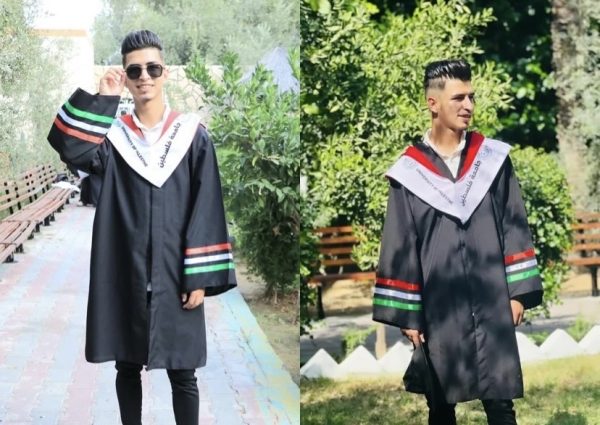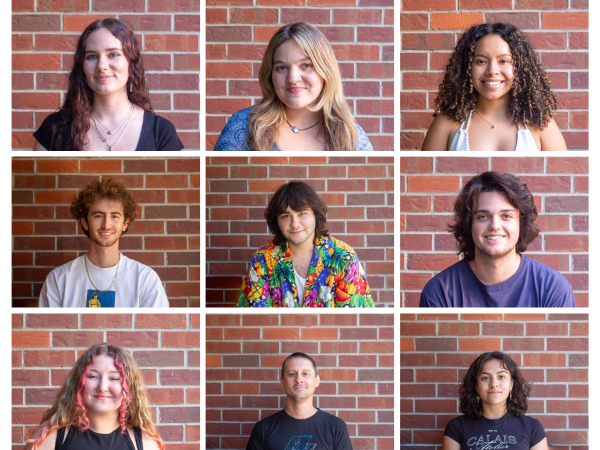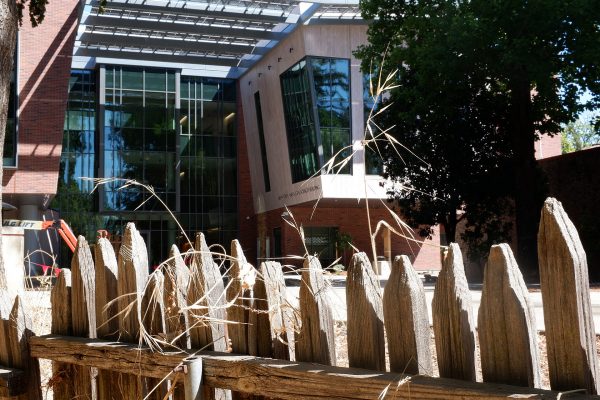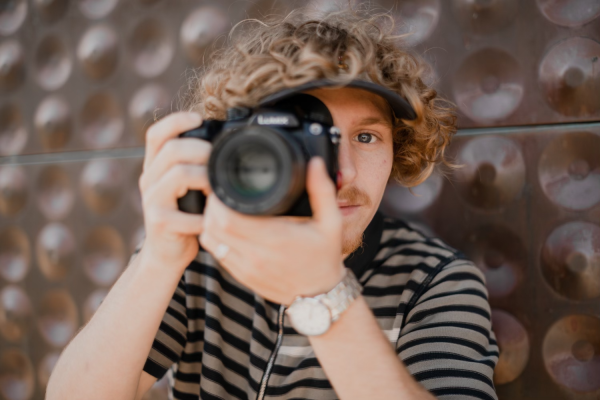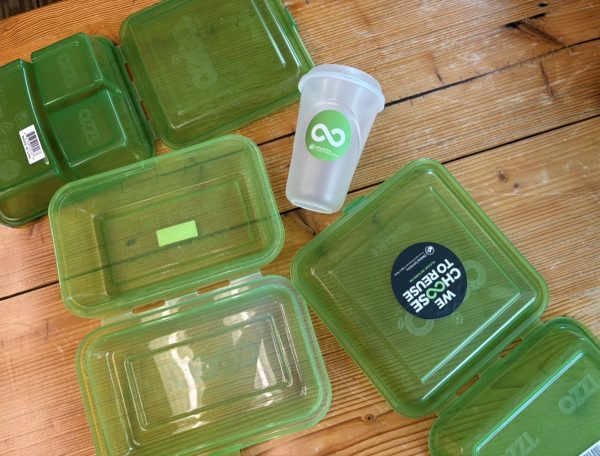‘The hope is more’: A look inside Ability First Sports
Ability First attendees at a wheelchair basketball event
“Catch,” one volunteer coach said, as the ball went through a young attendee’s hands and over her head. Elizabeth, who’s name has been changed due to being underage, spun around in the bright green wheelchair with two blocks of duct taped styrofoam stacked on top of each other to give her feet a place to rest. She exerted much of her energy to retrieve the basketball back from where she first lost it, determined to get it on her own.
“Ok, catch,” another coach said as she stepped in to pass it back to her. The result was the same the second time around. The ball, thrown a bit too high, went through Elizabeth’s hands and over her head. She exhaled greatly and though visibly annoyed, still let off an innocent laugh.
I watched for two hours as physically disabled and able-bodied participants learned the in’s and out’s of wheelchair basketball. Derek Vanderbom, one of the program’s handful of paraplegic coaches, was leading the pack of eager participants at Ability First’s monthly clinic.
Ability First Sports was created in 1985 by Eric Snedeker, a former Chico State professor in the Physical Education department and former assistant coach of the men’s soccer team. Ability First has provided over 1,000 wheelchair athletes in the Western United States access to an active lifestyle.
Their mission is to serve the needs of the person and the community. They use sports to inform the individual on a healthy lifestyle that keeps them active and their right to be included. These help plant the ideas of dreaming big, like scholarships to college for sports and traveling the nation kind of big. The program trains those interested in the field of Adapted Physical Education and encourages youth who are not disabled to partake in the events they have for two reasons — inclusion and removing the belief that those who are physically disabled are any different. There are week-long overnight summer camps specifically for children where they have a range of activities from basketball to water skiing along with various one-day events throughout the year where all ages are invited. The most recent was at the Chico Boys and Girls Club where attendees participated in wheelchair basketball on Nov. 12.
I was able to witness both missions the program has set out to achieve and instill in all of those who have come along since the beginning. While each new year provides different obstacles to tackle, those two ideologies remain constant. Many of those playing in the game were physically disabled but some who weren’t joined in to learn. One man in particular walked in with his Kobe Bryant basketball shoes, and with the height of a basketball player he looked like he could have picked up a ball and dunked it without stretching. Rather, he made his way to some vacant wheelchairs on the side of the court and got ready for the game, practicing his jump shot just as everyone else was. His Kobe’s never touched the court.
At this specific event, a little over a dozen attendees transitioned from navigating how to dribble and push their wheelchair, to bounce and chest passes and shooting and grabbing a loose ball, all while maintaining control of their wheelchairs. It looks like this; when the player gets next to the basketball, they pin it against the wheel as they are still moving causing it to roll upward into their lap.
The beginners were on one side of the court. On the other, there were four more Ability First Sports participants who seemed to have had their fair share of practice at wheelchair basketball. They practiced layup lines and rebounding, the three-man-weave and even drawing up some plays on a whiteboard to practice once the game got started. One of those experienced campers was rocking his Ability First hat and a pair of Fila basketball shoes. He was ready to hoop, ready to perfect the three-man-weave and primed to give buckets to the other campers.
Instead, after a few layups he stopped, wheeled himself over to the sidelines right in front of me and began talking to two mothers of some of the other campers. Michael Gabrielson, who has been attending the Ability First clinics for 15 years, had an infectious energy. He was drawn in by the dog of the mother he was talking to. A larger-than-normal golden retriever named Jack, was up and down and up and down, just waiting for someone to play with him. Can you blame him? There were dozens of balls rolling around in front of him and all he could do was watch.
Michael was petting Jack and talked to him with a baby voice as many dog lovers do. At one point he even wrapped the leash around his hand letting Jack pull him, though Jack was filled with a little too much energy and the small area he had to play in just wasn’t enough to calm him down.
When Jack wore himself out and returned Michael back to the basketball court another family walked in. I could only guess they were long time friends of Ability First. Michael slowly pushed himself from his wheelchair to give them all hugs. First the mom, then the dad. Thinking one step ahead Michael gave their baby, who was in the stroller, a little foot shake as he was being cautious of going from petting the dog to touching a baby. From there it was another conversation, this time about how quickly the young ones grow out of their shoes and how maybe it is in their best interest to just buy them a size up to give themselves some time. It’s who Michael is, chatting up friends he knew, parents he hadn’t seen in awhile and me. Someone he just locked eyes with, and with no hesitation he began to introduce himself to me as he was gathering up some of the basketballs.
After an informational conversation, I learned plenty about the program, those in attendance and Michael, who has a serious form of scoliosis. It’s condition in which he can’t bend his fingers or raise his arms above his head, but is still able to walk. Although, Michael admitted he “honestly walks like a penguin.”
At a school assembly 15 years ago, Christian Bailey, one of the program’s coaches, noticed Michael was wearing AFOs (ankle foot orthosis) that help improve walking patterns by supporting weaker muscles in the leg or foot. After the assembly, the two of them along with the school principal all met shortly after and were able to get Michael involved with the program as a first timer for free.
“When I got there I had been used to being bullied so I built a wall and I was a dick, I was just mean,” Michael said.
He was adamant that he was doing his best to keep that barrier up between himself and the rest of the campers.
But it only took one camp, one week over the summer, to break out of that shell. Michael admitted that he was pretending to be someone he wasn’t, when no one else in attendance was. No one else felt that they had to.
“They either got it worse than I do or the same, some of them got it better,” Michael said. “But the result is that nobody cares, nobody has pity for you, no one cares that you are disabled because we are all disabled.”
Our conversation took us just outside of the gym at the Boys and Girls Club. Michael pointed to the building diagonal from the gym where they played basketball and from where we were talking as he began talking about how close he felt to everyone inside. Ability First was having a Friendsgiving barbecue at another one of the buildings to keep the good times going. The prefix “friends” may not be appropriate for this get together. Not for Michael at least. To him they are all much more than friends.
“You won’t hear us call each other friends here,” Michael said. “That’s my brother, that’s my sister.”
Something else you won’t hear when you are around Michael is the word can’t. He insisted that the word is taboo inside the confines of the camp. The punishment if you do say it? Ice cold water is poured slowly over your head while you recite a pledge.
“I will never say can’t, ever, ever, ever,” Michael said, reciting the pledge back to me.
That pledge, the ice cold water punishment and the use of the forbidden word is actually a myth, according to Scott Dinits, co-director of Ability First.
“It’s not about scolding anyone for saying can’t, so often these young kids or adults who have different physical disabilities, they can get clumped into a medical model and labeled,” Scott said. “We view them as a person first, we want to see who they are, what their interests are, what their physical abilities and wants are and then we work through that.”
There is no scolding for saying the word can’t, however, there is power in showing someone that you can. When the group was practicing lay up lines it was obvious how much of a learning curve there is to position your body and arms just right while still trying to keep control of your wheelchair. You can imagine there were a handful of misses but eventually, the shots started to drop and the smiles were apparent. For Elizabeth it was different, it didn’t matter if she could get the form just right, there wasn’t enough force behind the shot to make it. Adapting to the situation, one of the coaches took the bag out of the garbage can and dragged it over for her. Just to see the ball go through something, to get that same satisfaction that the others had that the skills are coming together. Unfortunately the group moved on to another drill just before they brought the garbage can over.
During the pre-game drills, there was also some practicing of the bounce pass and the chest pass, the scoring seemed to have the attendees more excited, but an assist can be just as important. The youngest of those at the event, was partnered up with an older gentleman, the oldest of the bunch. With each pass of the ball they said one another’s names and as time went on the on-court chemistry was starting to forge.
Elizabeth, in her makeshift wheelchair with the duct taped styrofoam didn’t play in the five-on-five basketball game at first, she was timid and maybe with good reason. But then again, maybe not. Sure everyone was bigger than her, and yes — she did lack the physical strength to shoot the ball into a 10-foot hoop. But this isn’t Rucker Park, this isn’t streetball where someone is going to challenge you to a one-on-one to make a fool of you. This is Ability First, it is a few hours out of your Saturday to challenge yourself and no one else.
She later found herself on the court with her dad right beside her. She didn’t take a shot, but need I remind you that some of the best to ever play were pass-first kind of players, like Chris Paul, Magic Johnson and Sue Bird. Following in their footsteps, Elizabeth remembered the passing drill beforehand and with moving the ball around she went from having a good shot of her own to finding great ones for her teammates.
It is one of the things Scott said is incredible to be able to see.
“Sometimes the young people are teaching the adults, sometimes it’s vice versa and it truly is a blend where we are adapting together,” Scott said. “It’s amazing when you see a youngster that’s seven who couldn’t cycle, start cycling and everyone is learning what did we do, what did they do to make that happen?”
There is a learning process at each one of the events Ability First puts on or partakes in. A few months ago I met a handful of people from Ability First at the Chico Wildflower Century Ride, one of them being director Eric Snedeker. He and I spoke extensively at the Silver Dollar Fairgrounds in Chico under their canopy. He told me of a young girl who had never finished a mile on a bike in her life. That day, he was ecstatic when he heard a few moments before I spoke with him that she had just completed mile six. There was camaraderie that day just as there was at the wheelchair basketball event months later. There was encouragement from the coaches and ambition from the participants. Whether it was to meet new personal goals on a bike ride or keeping the follow through of a shooter’s touch on a nothing-but-net shot.
For Scott, challenging the kids in a healthy way is how they reveal to them all of their potential. It’s the combination of able-bodied coaches and paraplegic coaches who can provide learning from lived experience. Though reaching that potential comes from the determination of the kids, just take Elizabeth chasing down the basketball, focused and ready to use the method learned earlier in the morning of pinning the ball to the wheel as proof.
“We want to challenge and develop skills to see what they truly can do,” Scott said. “I might not always be there to hold the door open, get them back in their wheelchair if they fall out of it, to get them in the car — so if they do have that ability and capability then we are going to help them find out how to do it.
“They are learning from people who have that lived experience and can relate through empathy. But empathy through lived experience.”
Michael said that he has roomed with everyone at that event at a previous summer camp before. There wasn’t one thing about any of them he found annoying or inconvenient. Michael even made the remark that if he could live with those guys he would. He feels normal, and in a world where he is surrounded by those that are able-bodied he said that of course you’ll recognize that you are disabled and the people around you will as well. Though in an inexplicable way, he said that here at these one-day events or week-long camps, you forget.
You forget the things you thought you couldn’t do, the labels and the pity of those who will never be able to know your experiences. You forget the wall that you built up around yourself is no longer needed. And for Michael, maybe more than anybody, you forget that one word. The one word that according to him, will send a shiver down your spine. Can’t.
18 years later, Scott says he and the rest of the coaches learn more from those who attend the camps and weekend events. There is joy in seeing kids who are non-verbal be able to communicate with their peers in their own way. From telling jokes on their computer devices to giving a thumbs up or a thumbs down to express their needs to the rest. Or the kids who are able to develop the lacking characteristic of empathy at such an early age. Or helping navigate other young campers, especially the ones who Scott says fly in from other states and are experiencing a sleepover for the first time hundreds of miles away from all that they know. The list of inspirational things he has seen is a long one. The list of excuses anyone of those kids could make is just as long, but making excuses while at Ability First is few and far between for those campers. There is grit, resilience and a community of kid campers turned adults who have seen it, done it and become better because of it.
“All people in life regardless of their challenges should have the opportunity to be engaged citizens, to have jobs, to form lives of impact,” Scott said. “A lot of our participants are breaking down barriers and quite often they may be the first person to. Yet they aren’t trying to be the only and they aren’t trying to be the last.”
There is simplicity in the Ability First mentality, but it can take time to find such.
“None of us were this good when we first came in. When we first came in everybody sucked because everybody had that doubt in our minds. If it weren’t any of these coaches we’d still be that way,” Michael said when talking about how much he and the other campers have improved in the sports offered at camp.
When that same grit meets resilience, whether they make or miss the shot, the barrier is less and the hope is more.
Mason Tovani can be reached at [email protected]




